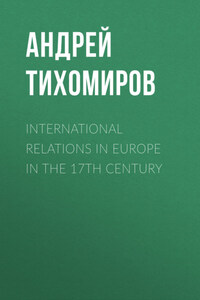If in the 16th century Spain played the first role in the international relations of Europe, then in the 17th century we can talk about the real hegemony of France. France emerged from the period of great civil unrest in the second half of the 16th century as a strong and established absolute monarchy. The numerous and hardworking peasantry of France and the rich bourgeoisie provided the treasury with enormous funds in the form of taxes. These funds allowed the French king and his nobility to pursue an energetic foreign policy and put France first in Europe. The experience of the long and ruinous wars of the 16th century, which ended in the civil war in France, was not in vain. Any desire of the new state to expand was met with resistance from other similar states; any claim to conquest, and even more so to world domination (on the scale of the 16th century) evoked hostile coalitions. Politicians and diplomats of the 17th century, summarizing this experience, formulated a number of provisions that had the character of international principles. True, these principles were very often violated. Nevertheless, it was precisely these systematic violations, given the extreme instability of international relations of that time, that caused the need for some kind of norm. In particular, the ideas of “natural boundaries” and “political balance” had such a “normative” character.
Politicians – contemporaries of Henry IV and, first of all, his chief assistant Sully – constantly emphasized that you can only capture what can be preserved. The power of the state has its limits: having crossed them, it provokes against itself the united forces of enemies and envious people. Sully in his famous memoirs “Principles of State Economy” wrote: “Every king of France should rather think about acquiring friends and allies firmly connected with him by common interests – and this is the most reliable connection – than attract unquenchable hatred and enmity with projects that exceed his own strength.” “You strive,” says the remarkable French diplomat Etienne Pasquier in his dialogue between the philosopher and the sovereign, “to give good borders to your state; It is necessary that you first set proper boundaries for your hopes and desires.”
Where to look for these boundaries? Sully knows well that Charlemagne restored the empire, and that under the Capetians France was confined to “narrow state borders, in which it remains to this day.” He states that France has a natural border in the south – the Pyrenees. He understands perfectly well that returning France to its former glory means returning “the neighboring territories that once belonged to it,” i.e. Savoy, Franche-Comté, Lorraine, Gennegau, Artois, the Netherlands. “But is it possible to claim all this without arousing the hatred of enemies and ruinous wars? And the French kings themselves have such an ambition that for France is worse than all the hatred of foreigners.” France is well-fed: it is strong enough not to be afraid of anyone and to be terrible for everyone. However, Sully also dreamed of French hegemony over the civilized world, over all Christian peoples. This is where one strange draft of an international agreement comes from, which Sully attributed to his king, but probably composed himself. The “great plan” of King Henry IV was, according to Sully, to reduce the Habsburgs to the level of sovereigns of one Iberian Peninsula, drive the Turks and Tatars to Asia, restore the Byzantine Empire and then redraw the entire political map of Europe. Europe will be divided into six hereditary monarchies, five elective monarchies and five republics. At the head of all these states a special council will be placed, which will protect the general peace and resolve disputes between states, between sovereigns and their subjects. The president of this unique republic of Christian states will be the pope; France will be his first minister. Sully's secret thought behind this entire seventeenth-century League of Nations project was clear. To weaken the enemies of France, to strengthen her vassals, to surround her with a belt of neutral states that would legally be under her protection, and in fact under her command – this was this fantastic “grand design” of the first servant of King Henry IV.
Sully's plan is known only from his memoirs. The reality was far from such projects. This was demonstrated by King Henry IV himself with his practical policies, and even more so by his brilliant successor, the greatest of the noble politicians of absolutist France, Cardinal Richelieu.
Without losing sight of the norms of natural boundaries for his country, Henry IV acted in foreign policy according to another principle, which was widely practiced at this time. This was the principle of “political balance”. If the new state was national, that is, built on the basis of the economic unity of the territory and the associated unity of language and culture, then in its relations with other states it sought to protect this whole from their encroachments. Practically in foreign policy, this led to the desire to preserve the historically established balance of power between European states, to create a counterbalance to any rapidly growing power, and in the event of seizures carried out by the strongest power, to compensate for the weaker ones in order to restore the same “balance.” Of course, all such “principles” were valid only as long as it was impossible or dangerous to violate them by force.
Henry IV was guided by “principles” while it was dangerous to round and expand the borders of France in any other way. In practice, he strove for two goals: to weaken the power of the Habsburg dynasty and to maintain the emerging balance between the European powers, which was beneficial for France. In these forms, he continued to maintain friendly relations with England, which helped him, as a Protestant and enemy of Spain, to seize the French throne. However, at the same time, Henry secretly opposed the plans of English sailors and merchants and the machinations of English diplomats in Italy and the East, where, as is known, France had been firmly entrenched since the time of Francis I. As a result of this, the ambassadors of Henry IV in London – Thumery, Harle de Beaumont and La Borderie always faced the difficult task of combining friendship with England with opposition to the desire of the same power to take a leading position. All for the same purposes of weakening the Habsburgs, Henry IV contributed to the conclusion of peace between Spain and Holland. Thus, the French king promoted Spain's recognition of the independence of the 7 northern provinces of the Netherlands that had fallen from it. In the East, in Turkey, Henry restored French influence, which had been shaken during the religious wars, with the help of the successful diplomatic activities of his ambassadors Savary de Breves and Jean de Gonto-Biron. The benefits received by Francis I in 1535 were fully restored in 1604. 5 All nations wishing to trade with Turkey had to send their ships there under the French flag. The exception was the British, who managed to obtain from the Sultan at the end of the 16th century (1599) the right to enter his ports under their own flag. Henry's friendship with the Sultan was a means to frighten the emperor (Habsburg) with the invasion of Turkish armies, and the Spanish king (also Habsburg) with the attack of the Turkish fleet. Both were the key to the security of France. At the same time, however, Henry did not prevent his friends and pious but naive admirers from spreading rumors about his intentions to conquer the East, expel the Sultan from Europe and declare a crusade against him. In relation to the German princes, Henry also adhered to the realpolitik bequeathed to him by the 16th century. His representative Bongar assured the German Protestant princes that Henry’s transition from Protestantism to Catholicism should not embarrass them: the king’s friendly attitude towards the German princes remains unchanged, as does his desire to continue to be the defender of “original German freedom.” Since the princes were strong, the emperor, the eternal enemy of France, Habsburg, was weak. Henry IV finally managed to create a coalition against the Habsburgs and begin organizing the fight against them. However, Ravaillac's dagger interrupted his life (1610).












